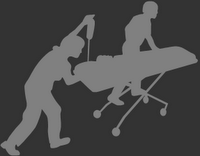''It doesn't hurt, but it's sore.''
The meaning of these ambiguously confused words became more meaningful to me just a few hours after a lecture about carpal tunnel syndrome...
We interviewed a standardized pt who had trouble sleeping and I was the first one to go in my group. It was difficult getting info from him and I felt like it was getting to the point where he was just repeating himself as I rephrased my questions.
So, you're not drinking any caffeine before you go to sleep? No.
No coffee, or tea or anything like that... "Noo," he replies, an edge to his voice belies his grumpiness.
Have you been dozing off during the day? Nope. Hows your energy lvl? Good.
I left the interview frustrated and unsatisified that I didn't establish a good diagnosis... I ended up by concluding that he still needs to get used to his schedule of running in the afternoon instead of his usual morning runs.
Upon watching the review video, I soon learned that he had plenty to say after the simulated patient encounter. "NAPS, buddy!" He growled, shaking his head in disappointment that these were the sort of people training to become doctors.
I felt disappointed. Was I too imprecise in my language? I asked the exact same question as a later person, but in her case, the patient said "Nope. Oh.... wait..... yeah. I've been taking naps." It was this dawning of comprehension that helped him realize the reason he was having trouble sleeping. Was this a question that I should have clarified? Something that I should have twisted around and pursued one last time in the 8 minute time frame I had to diagnose this mystery problem?
Doze:v.intr.To sleep lightly and intermittently.v.tr.To spend (time) dozing or as if dozing: dozed the summer away.n.Phrasal Verb:A short, light sleep.doze offTo fall into a light sleep.[Probably of Scandinavian origin.]
via FreeDictionary.comNap:
n.A brief sleep, often during the day.intr.v. napped, nap·ping, naps1. To sleep for a brief period, often during the day; doze.2. To be unaware of imminent danger or trouble; be off guard: The civil unrest caught the police napping.[Middle English, from nappen, to doze, from Old English hnappian.]
Perhaps the old man was getting into the patient "denial rhythm." Is this wrong? No. How about this, this and this? No, no, no. This? NO! Perhaps he didn't hear the question. Perhaps he was waiting for the keyword "Nap" and "Doze" wouldn't do.
Perhaps it was my fault. I might have waited a little bit longer after asking him about dozing off... about his energy level during the day... about the amount of sleep he gets each night (and perhaps clarified over a 24 hour period.) I could have used the word nap and been much more satisfied with my performance.
Perhaps it is for the best that this was a make-believe patient and I am still a make-believe doctor. I still have plenty to learn and I hope that these small little errors will continue to bother me enough that I can distinguish these little patient language intricacies that will guide me to the right diagnoses.







